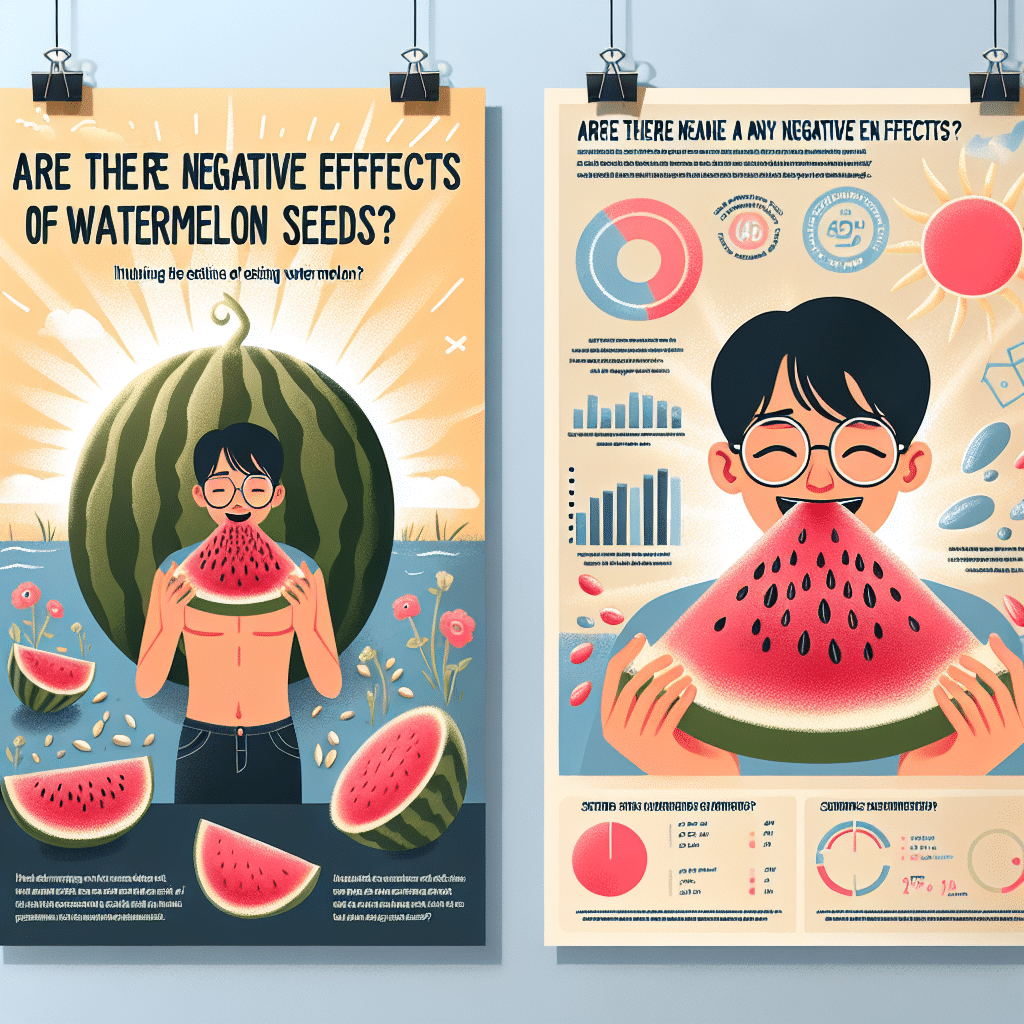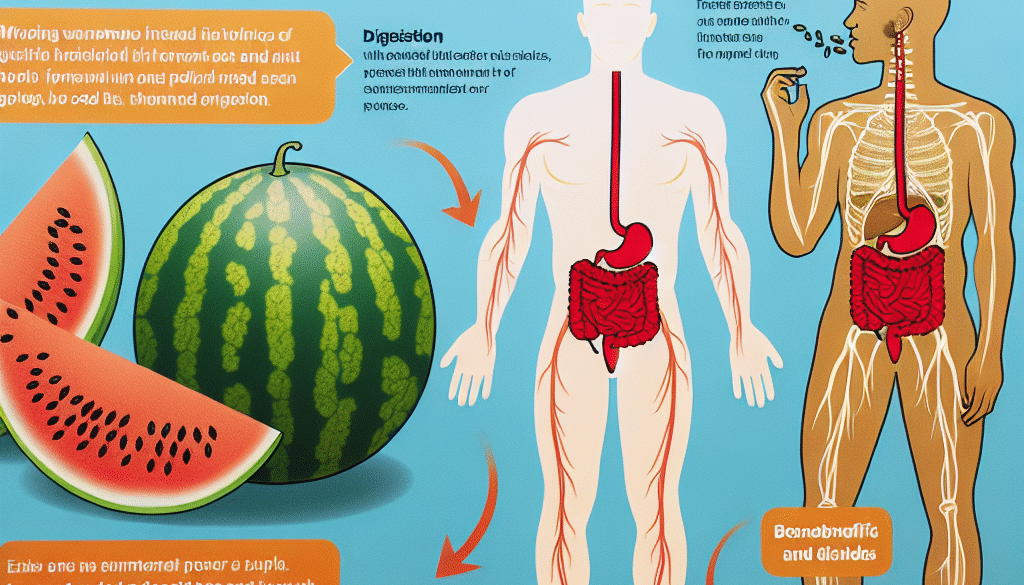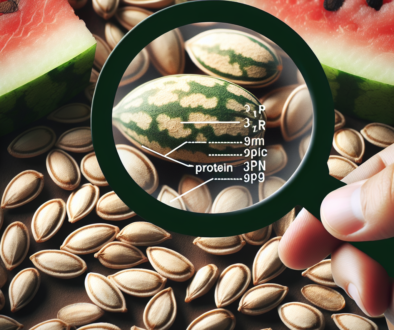Are There Any Negative Effects Of Eating Watermelon Seeds?
-
Table of Contents
- Negative Effects of Eating Watermelon Seeds: Fact or Fiction?
- Understanding Watermelon Seeds
- Potential Health Benefits of Watermelon Seeds
- Myths and Misconceptions
- Are There Any Negative Effects?
- Digestive Issues
- Caloric Content
- Anti-Nutrients
- Allergic Reactions
- How to Safely Consume Watermelon Seeds
- Case Studies and Research
- Conclusion: Balancing the Pros and Cons
- Discovering Protein-Rich Alternatives with ETprotein
Negative Effects of Eating Watermelon Seeds: Fact or Fiction?

Watermelon is a refreshing and hydrating fruit that is especially popular during the summer months. While we often focus on the juicy flesh, watermelon seeds are frequently discarded or considered a nuisance. However, in recent years, there has been a growing interest in the potential health benefits and risks associated with consuming watermelon seeds. This article delves into the question: Are there any negative effects of eating watermelon seeds?
Understanding Watermelon Seeds
Before we can address the potential negative effects, it’s important to understand what watermelon seeds are composed of. Watermelon seeds are rich in nutrients such as magnesium, iron, and zinc. They also contain healthy fats, protein, and fiber. In many cultures, watermelon seeds are roasted and eaten as a snack or ground into flour for use in baking.
Potential Health Benefits of Watermelon Seeds
Contrary to the belief that watermelon seeds are inedible, they offer several health benefits:
- Nutrient-Rich: Watermelon seeds are a good source of nutrients like magnesium, which is important for heart health and maintaining bone integrity.
- Protein Content: They provide a decent amount of protein, which is essential for muscle repair and growth.
- Healthy Fats: The seeds contain mono- and polyunsaturated fats, which are beneficial for heart health.
Myths and Misconceptions
One common myth is that eating watermelon seeds can lead to the growth of a watermelon in your stomach. This is, of course, a complete fallacy. The digestive system breaks down seeds long before they could ever germinate.
Are There Any Negative Effects?
Despite the nutritional benefits, there are a few potential negative effects to consider when consuming watermelon seeds:
Digestive Issues
For some individuals, eating watermelon seeds may lead to digestive discomfort. This can occur if the seeds are not chewed properly or consumed in large quantities, as they are high in dietary fiber.
Caloric Content
Watermelon seeds are relatively high in calories due to their fat content. Overconsumption could potentially lead to weight gain if not balanced with physical activity.
Anti-Nutrients
Like many seeds and grains, watermelon seeds contain anti-nutrients such as phytic acid, which can bind to minerals and reduce their absorption. However, the impact is usually minimal and not a concern for most people with a balanced diet.
Allergic Reactions
Though rare, some individuals may have an allergic reaction to watermelon seeds. Symptoms could include itching, swelling, and gastrointestinal distress.
How to Safely Consume Watermelon Seeds
To minimize any potential negative effects, consider the following tips:
- Chew Thoroughly: Properly chewing the seeds helps in digestion and nutrient absorption.
- Moderation: Enjoy watermelon seeds in moderation to avoid excessive calorie intake.
- Preparation: Roasting or sprouting the seeds can reduce anti-nutrient levels and improve digestibility.
Case Studies and Research
Research on watermelon seeds is limited, but studies on similar seeds suggest that when prepared and consumed properly, they can be a healthy addition to the diet. For example, a study published in the Journal of Agricultural and Food Chemistry found that sprouting pumpkin seeds, which have a similar nutrient profile to watermelon seeds, significantly decreased anti-nutrient content and increased protein availability.
Conclusion: Balancing the Pros and Cons
In conclusion, while watermelon seeds are nutritious and can be part of a healthy diet, they should be consumed in moderation and with proper preparation to minimize any potential negative effects. For most people, the benefits of including watermelon seeds in their diet outweigh the risks.
Discovering Protein-Rich Alternatives with ETprotein
If you’re looking for alternative sources of protein that are easy to incorporate into your diet, ETprotein offers a range of high-quality protein products. Their watermelon seed protein is an excellent plant-based protein option that is non-GMO and allergen-free. With a neutral taste, it’s a versatile ingredient for shakes, smoothies, and other recipes.
ETprotein’s commitment to quality ensures that you receive the best product for your nutritional needs. Whether you’re interested in sports nutrition, weight management, or general health and wellness, ETprotein has a protein solution for you.
About ETprotein:
ETprotein, a reputable protein and L-(+)-Ergothioneine (EGT) Chinese factory manufacturer and supplier, is renowned for producing, stocking, exporting, and delivering the highest quality organic bulk vegan proteins and L-(+)-Ergothioneine. They include Organic rice protein, clear rice protein, pea protein, clear pea protein, watermelon seed protein, pumpkin seed protein, sunflower seed protein, mung bean protein, peanut protein, and L-(+)-Ergothioneine EGT Pharmaceutical grade, L-(+)-Ergothioneine EGT food grade, L-(+)-Ergothioneine EGT cosmetic grade, L-(+)-Ergothioneine EGT reference grade and L-(+)-Ergothioneine EGT standard. Their offerings, characterized by a neutral taste, non-GMO, allergen-free attributes, with L-(+)-Ergothioneine purity over 98%, 99%, cater to a diverse range of industries. They serve nutraceutical, pharmaceutical, cosmeceutical, veterinary, as well as food and beverage finished product distributors, traders, and manufacturers across Europe, USA, Canada, Australia, Thailand, Japan, Korea, Brazil, and Chile, among others.
ETprotein specialization includes exporting and delivering tailor-made protein powder and finished nutritional supplements. Their extensive product range covers sectors like Food and Beverage, Sports Nutrition, Weight Management, Dietary Supplements, Health and Wellness Products, and Infant Formula, ensuring comprehensive solutions to meet all your protein needs.
As a trusted company by leading global food and beverage brands and Fortune 500 companies, ETprotein reinforces China’s reputation in the global arena. For more information or to sample their products, please contact them and email sales(at)ETprotein.com today.












